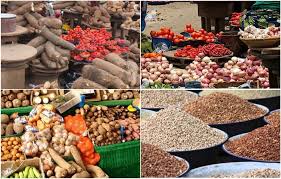By Atoyebi Nike
Food prices continued their steep rise across Lagos State in July 2025, with major staples such as onions, local rice, and pepper experiencing sharp cost increases in key markets including Mile 12, Mushin, Oyingbo, and Daleko. The situation has compounded the economic pressure on households already grappling with Nigeria’s worsening inflation and stagnating wages.
According to the July edition of the Lagos Food Price Survey, compiled by local market observers and analysts, prices of essential food items recorded double-digit increases in most locations, despite isolated declines in a few goods due to seasonal harvests.
Breakdown of Market Trends:
Onions: The price of a 100kg bag of onions surged from ₦35,000 in June to over ₦52,000 in July, representing a 48.5% jump. Traders at Mile 12 attributed the spike to rising transport costs and poor harvest yields in northern supply states like Sokoto and Kebbi.
Local Rice: A 50kg bag of Nigerian parboiled rice increased from ₦46,000 to ₦54,000, with import restrictions and fuel subsidy removal cited as major factors.
Pepper: A medium basket of scotch bonnet (atarodo) rose from ₦18,000 to ₦28,000, particularly in Mushin and Oyingbo markets, where sellers blamed rainfall-induced supply disruptions from the North.
However, the survey also noted that prices of garri, tomatoes, and yam showed mild reductions of between 5% and 10%, credited to mid-season harvests in states like Ogun, Oyo, and Kogi.
Causes Behind the Price Surge:
Inflationary Pressure: Nigeria’s annual inflation rate soared to 34.1% in June 2025, with food inflation hitting 42.3%, according to the National Bureau of Statistics (NBS). Analysts warn that rising core inflation driven by fuel, electricity tariffs, and logistics continues to erode consumer purchasing power.
Transport Bottlenecks: Following the full deregulation of fuel prices in May, diesel now sells for over ₦1,500 per litre, increasing transportation costs by nearly 60% since January. This has impacted food haulage from rural farms to Lagos urban markets.
Volatile Supply Chains: Security concerns along agricultural corridors in Niger, Zamfara, and Kaduna including frequent banditry and farmer-herder clashes have disrupted the movement of goods and delayed market replenishments.
Market Voices:
“We’re facing multiple crises at once fuel is expensive, the roads are unsafe, and storage is poor. Even if goods are available in the North, bringing them to Lagos now costs a fortune,” said Mallam Ibrahim Musa, an onion dealer in Daleko.
Households are already feeling the squeeze. Mrs. Ngozi Nwankwo, a mother of three shopping in Oyingbo, said, “I used to cook jollof rice twice a week, but now rice and pepper are unaffordable. I’ve had to cut meals and focus on garri and beans instead.”
Government and Policy Gaps:
Despite repeated calls for food market interventions, analysts say Nigeria’s government has not implemented enough short-term stabilization measures. Dr. Aisha Lawal, an economist at the Centre for Food and Livelihood Policy, remarked:
“We need structured transport subsidies for food haulage, warehousing support for farmers, and urgent engagement with states facing insecurity. If not, this food crisis will deepen into famine-like conditions in urban slums.”
There have been appeals to the Lagos State Government and Federal Ministry of Agriculture to deploy mobile food markets in low-income neighborhoods and subsidize food transportation temporarily to ease inflationary burdens.
